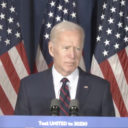

Texas Sen. Ted Cruz, left, Donald Trump, center, and Florida Sen. Marco Rubio, right (Photos: Getty/AP/Getty)
Early South Carolina exit polls show a deeply distrustful and angry Republican primary electorate and a record-breaking evangelical vote. Donald J. Trump is leading among men with 34% and women with 26%. Ted Cruz carried voters age 18 to 29 by 30% to 25% for Trump, while both him and Marco Rubio each took 28% of the 30 to 44 age group.
But Trump is carrying every other age demographic, including 45 to 64 (32% to 25% for Rubio) and 64 plus (31% to 24% for Rubio).
(PPD will continuously update the numbers)
Voters who said they are angry with the federal government chose Donald Trump first with 38%, 28% chose Cruz, Rubio took 18% and Ben Carson 8%. These voters made up 46% of Republican primary voters, while 48% said they prefer someone with experience.
Late deciders went for Rubio 30%, Cruz 28%, Trump 16% and Kasich by 11%. While there are a substantial number of late deciders–about 4 in 10 say they made up their minds only today or in the last few days–that’s down from 47% in New Hampshire. Early deciders, in previous states, have been good for Trump.
More than 4 in 10 favored illegal immigrants, another strong showing of support for Trump in New Hampshire. But, more importantly, 4 in 10 say Trump is best among the five top candidates to handle the economy, more than twice as many as those who chose his nearest competitor on this issue, Ted Cruz.
A whopping 74% of South Carolina Republican primary voters said they support Trump’s temporary ban on Muslim immigration to the U.S., while just 23% do not. That’s an even larger margin than the 65% support found in New Hampshire, where the frontrunner won with an 18-point margin.
That said, South Carolina exit polls show nearly three-quarters of Republican primary voters identify themselves as born-again or evangelical Christians. That’s far higher than the models predicts and, if it holds, will set another record, up from 65% in 2012. Eight in 10 GOP voters in South Carolina identify themselves as conservative, and 4 in 10 as very conservative, which could benefit Cruz. However, exit polls show they are split between Trump (30%) and Cruz (30%) evenly.
White evangelicals backed Trump slightly over Cruz, 31% to 29%. Polls showed Trump carrying both voters, but the models polled a smaller group and both are on track to set records in exit poll data in the state back to 1992. In the final day, Cruz dispatched some 10,000 evangelical volunteers to do a little Christian-to-Christian persuading.
In what could potentially hurt Trump, nearly half said it matters “a great deal” to them that a candidate shares their religious beliefs, which is up very sharply from the 26% who said so in 2012. The top candidate attribute voters are seeking is someone who “shares my values,” again a much weaker group for Trump in earlier contests, and one that is consistently better one for Cruz, though it was the most-desired quality in New Hampshire and Iowa, as well.
The problem for anti-Trump voters, is that they split that vote and could allow Trump to win with less than a third of the vote. For those who said the Supreme Court appointment was their number one issue, Cruz got 30%, Trump got 26%, and Rubio got 21%.
Of those who said terrorism was their top issue, Cruz won 31%, Trump won 27%, while Rubio took 25% and Bush 7%.







